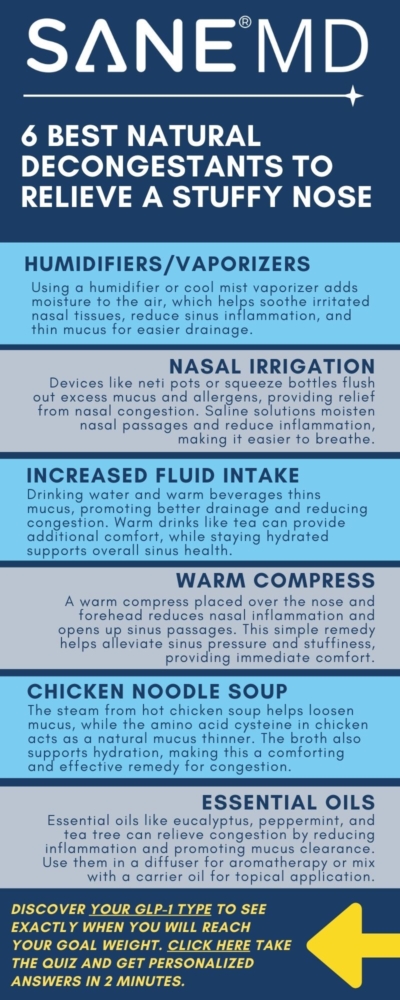The 6 Best Natural Decongestants to Relieve Stuffy Nose in 2024
Natural decongestants can provide safe and effective relief from stuffy nose and sinus problems, whether a cold, allergies or some other ailment cause the symptoms. Indeed, they are a better alternative to over-the-counter remedies for congestion that often come with unwanted side effects, making you feel tired, sluggish, and foggy-headed.
In this comprehensive guide, you’ll discover six scientifically-backed natural remedies that offer safe, natural congestion relief. Home remedies like these are often gentler on the body and may be a better option for regular use.
- Nasal and sinus congestion can be caused by various factors, like the common cold, the influenza virus, allergies, pollution, or dry air.
- Though numerous prescription and over-the-counter decongestants exist, they often cause troublesome side effects that can significantly interfere with your daily life. Natural decongestants like humidifiers, nasal irrigation, keeping hydrated, using warm compresses, using a throat cleaner, eating chicken noodle soup, and trying essential oil may be healthier options with fewer side effects.
- See your doctor immediately if you experience chronic congestion, if your symptoms don’t improve within a few days of using natural decongestants, or if you have a high fever or chest pain.
Causes of Nasal Congestion
If you’re experiencing nasal congestion, it could be due to various factors like a cold, flu, allergies, pollution, or dry air.
Many people assume that excess mucus is the culprit, but in reality, inflamed blood vessels in the sinuses cause nasal congestion. When an irritant like an allergen or virus enters the nose, it increases blood flow to the vessels lining the nasal cavity. Consequently, the nasal passages become swollen, making it difficult to breathe. Swelling can also hinder mucus drainage, leading to further airflow blockage.
The good news is you can relieve your congestion at home with the simple remedies below, regardless of the cause, without visiting a drugstore.
Natural Decongestants for Nasal Congestion
1. Use a Humidifier or Cool Mist Vaporizer Regularly
A humidifier or cool-mist vaporizer is a simple and effective way to alleviate sinus congestion and nasal stuffiness in your home or office. Breathing in humid air can help soothe irritated nasal tissues, reduce sinus inflammation, and thin mucus, which allows it to drain.
Both warm-mist and cool-mist machines are natural decongestants that are effective in increasing humidity levels and relieving congestion. However, using cool-mist vaporizers for children is essential since warm-mist humidifiers can cause burns if they get too close or knock the machine over.
Strive to maintain indoor relative humidity between 30% and 50% (1). Dry air may worsen congestion, but excess moisture can cause mold and worsen allergies.
Regardless of the type of unit you choose, change the water daily and clean it according to the manufacturer’s instructions to prevent the growth of bacteria and mold.
Don’t have a humidifier or a cool mist vaporizer? No problem. Here are a few DIY ways to create natural decongestants by adding moisture to the air:
- Boil a pot or kettle of water on the stove for a few minutes. This method uses the power of evaporation to moisturize the air. Evaporation turns the water into vapor, which moisturizes the air in your home.
- Take a hot shower, breathing in the steam.
- Inhale the steam of a pot of hot water. For this method, start by heating a pot of water on the stove until it’s almost but not quite boiling. Then, create a tent by draping a towel over your head to trap the steam. While keeping your head under the towel, lean carefully over the pot and inhale the steam for approximately five to ten minutes.
- Run a tabletop fountain. This not only adds moisture to the air, but the sound of running water also soothes the nerves!
2. Try Nasal Irrigation
If you’re experiencing nasal congestion and blocked sinuses, using a nasal irrigator like a neti pot, bulb syringe, or squeeze bottle might help. These devices can provide relief by moistening your nasal passages and loosening thick mucus.
If you’re worried about pouring water into your nose, you’ll be glad to know that many nasal irrigators come with a salt mixture that can help reduce the discomfort of this process. To make the saline solution, follow the instructions on the package, mix it with lukewarm water, and then follow these steps:
- Lean over a sink.
- Tilt your head sideways.
- Gently pour the water into one nostril while breathing through your mouth. The solution will drain out your other nostril.
- Repeat on the other side.
Never use tap water in your neti pot for best results and to avoid complications. Instead, use distilled bottled water or water that has been boiled and cooled.
You must also clean your neti pot thoroughly after each use. Ensure it’s free of dust, cleaning chemicals, or anything else that could irritate your nasal passages or trigger allergies.
3. Increase Fluid Intake
Drinking plenty of water can help clear congestion and promote mucus flow. Warm water and other liquids are effective, but avoid caffeinated beverages.
Fun fact: Many people believe that drinking hot tea can help relieve congestion, but according to a previous study (2) published in the Rhinology journal, it may not matter if the drink is hot or cold. In the study, researchers divided a group of people with cold and flu symptoms into two groups: one was given a hot drink, while the other received a room-temperature glass. The study found no significant differences in nasal airflow between the two groups.
However, the group that consumed the hot beverage reported feeling more relief from cold symptoms than the others. The researchers suggest that this could be because the drink’s heat enhances the flavor and overall experience, which can make you feel better.
4. Use a Warm Compress
If you’re struggling with a stuffy nose, a warm compress may help alleviate the discomfort by decreasing inflammation and opening up your nasal passages from the outside.
To make one, soak a washcloth or small towel in warm (not hot) water, then wring out the excess water and fold it. Place the compress over your upper nose and lower forehead to enjoy the soothing warmth.
This can help reduce inflammation in your nostrils and sinuses, making breathing easier. Be sure not to keep the compress on your face for too long to avoid the risk of burning your skin.
5. Eat Chicken Noodle Soup
Chicken noodle soup is one of the most popular decongestants for those feeling under the weather, and for good reason. The steam created by hot soup can help hydrate and loosen mucus, while cysteine in chicken can break up and thin mucus. It’s important to note that the broth in chicken soup can also benefit hydration, but it’s best to avoid high sodium levels.
Cysteine is an amino acid in foods like chicken, turkey, garlic, yogurt, eggs, and whole grains. It can also be taken as a dietary supplement. Cysteine has been used as a supplemental treatment for bronchitis and chronic obstructive pulmonary disease, in addition to helping with congestion.
6. Try Essential Oils
It is believed that certain essential oils are natural decongestants that may provide relief from congestion symptoms, although there is limited evidence to support this.
In a study conducted in 2010, participants were given an essential oil spray containing peppermint, eucalyptus, oregano, and rosemary five times a day for three days. Upon concluding the study, researchers found that the spray effectively improved upper respiratory symptoms immediately after use but did not alleviate symptoms after three days of use.
Essential oils can be combined with carrier oils, such as coconut or jojoba oil, and applied topically to the cheeks to relieve sinus pressure and congested sinuses. Alternatively, they can be used in a diffuser for aromatherapy.
Some of the essential oils found to help sinus infections and relieve sinusitis symptoms include:
- Eucalyptus oil
- Lavender oil
- Tea tree oil
- Rosemary oil
- Peppermint oil
It is important to keep essential oils out of reach of children and pets, as they can be toxic if ingested.
When to See a Doctor if Using Natural Decongestants
Congestion can cause breathing, sleeping, and eating difficulties. If natural remedies don’t work after a few days, seek medical consultation. You also must see a doctor if you experience the following:
- Severe sinus symptoms, such as nosebleeds, which can indicate acute sinusitis
- High fever
- Trouble breathing
- Chest pain
Summary
Having a congested nose is a common indication of colds, flu, allergies, and a sinus infection, which can lead to inflamed nasal passages and airways filled with mucus.
Over-the-counter medications can offer short-term relief from congestion but often have distressing side effects. Thankfully, many natural remedies can relieve nasal congestion and sinus pain without side effects.
However, it’s important to note that although many natural decongestants are generally safe for everyone, some come with risks for adults and children.
If your congestion persists despite trying natural remedies or worsens, it’s best to schedule an appointment with your doctor for proper evaluation and treatment.
Frequently Asked Questions
What are good natural decongestants?
Looking for a solution to ease sinus congestion and nasal stuffiness at home or in the office? Consider using a humidifier or cool-mist vaporizer. This simple and effective natural method involves breathing in humid air, which can help soothe irritated nasal tissues, reduce sinus inflammation, and thin mucus to facilitate drainage. Give it a try and experience the benefits for yourself!
How can I unblock my sinuses naturally?
Natural home remedies to relieve facial pain and pressure and sore throat from sinus congestive, allergic rhinitis, dry nasal passages, and other sinus congestion symptoms include:
- Using a humidifier or cold-mist vaporizer
- Employing nasal irrigation using neti pots or other method
- Increasing fluid intake
- Using a warm compress on the face and nose
- Eating chicken soup
- Using essential oils
- Using a saline nasal spray
What can I drink to unclog my sinuses?
- Herbal tea
- Cold or warm sterile or distilled water
- Hot water with lemon and honey
- Broth
What can I eat to unclog my sinuses?
- Chicken noodle soup
- Spicy foods like red peppers and chillies
- Pineapple
- Ginger
- Antioxidant-rich foods like berries, pumpkin, pineapple, and kiwi. These foods have anti-inflammatory properties that reduce inflammation in your nasal passages, supporting your respiratory system.
- New Report Says Your Brain Could Be the Key to Reducing Phlegm Over 50
- Doctor's "Leave The Throat Phlegm Behind" Tutorial Goes Viral With People Over 50
- Can You Relieve Throat Phlegm and Coughing In 60 Seconds A Day? This Doctor Says Yes
- How To Banish Phlegm When 50+ (Do This Every Day)
References
1- https://medlineplus.gov/ency/article/002104.htm
Dr. Matthew Olesiak, MD, is the Chief Medical Director at SANESolution, a renowned wellness technology company dedicated to providing evidence-based solutions for optimal living. Dr. Olesiak earned his medical degree from the prestigious Jagiellonian University Medical College in Kraków, Poland, where he developed a strong foundation in medicine.






